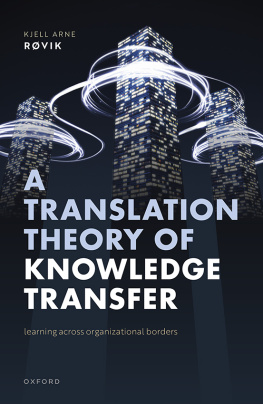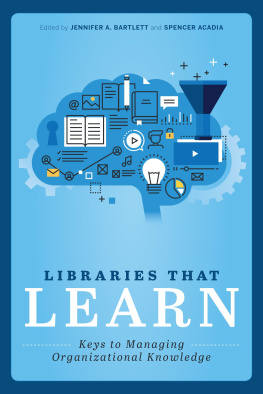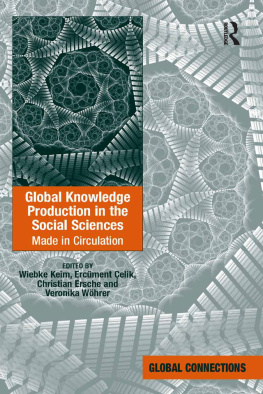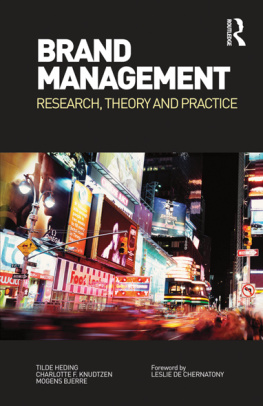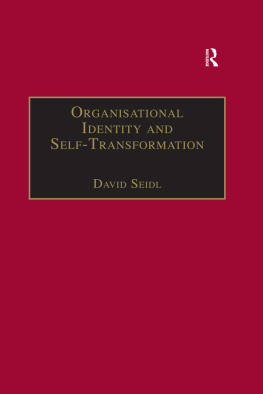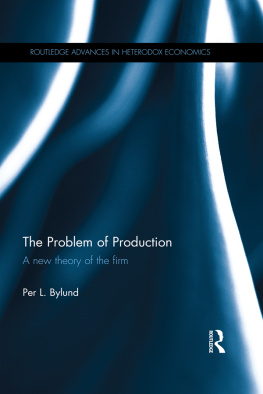THE PRODUCTION OF
MANAGERIAL KNOWLEDGE
AND ORGANIZATIONAL THEORY
RESEARCH IN THE SOCIOLOGY OF ORGANIZATIONS
Series Editor: Michael Lounsbury
Volume 38: Configurational Theory and Methods in Organizational Research
Volume 39A: Institutional Logics in Action, Part A
Volume 39B: Institutional Logics in Action, Part B
Volume 40: Contemporary Perspectives on Organizational Social Networks
Volume 41: Religion and Organization Theory
Volume 42: Organizational Transformation and Scientific Change: The Impact of Institutional Restructuring on Universities and Intellectual Innovation
Volume 43: Elites on Trial
Volume 44: Institutions and Ideals: Philip Selznicks Legacy for Organizational Studies
Volume 45: Towards a Comparative Institutionalism: Forms, Dynamics and Logics Across the Organizational Fields of Health and Higher Education
Volume 46: The University Under Pressure
Volume 47: The Structuring of Work in Organizations
Volume 48A: How Institutions Matter!
Volume 48B: How Institutions Matter!
Volume 49: Multinational Corporations and Organization Theory: Post Millennium Perspectives
Volume 50: Emergence
Volume 51: Categories, Categorization and Categorizing: Category Studies in Sociology, Organizations and Strategy at the Crossroads
Volume 52: Justification, Evaluation and Critique in the Study of Organizations: Contributions from French Pragmatist Sociology
Volume 53: Structure, Content and Meaning of Organizational Networks: Extending Network Thinking
Volume 54A: Multimodality, Meaning, and Institutions
Volume 54B: Multimodality, Meaning, and Institutions
Volume 55: Social Movements, Stakeholders and Non-market Strategy
Volume 56: Social Movements, Stakeholders and Non-market Strategy
Volume 57: Towards Permeable Boundaries of Organizations?
Volume 58: Agents, Actors, Actorhood: Institutional Perspectives on the Nature of Agency, Action, and Authority
RESEARCH IN THE SOCIOLOGY OF
ORGANIZATIONS, VOL 59
THE PRODUCTION
OF MANAGERIAL
KNOWLEDGE AND
ORGANIZATIONAL THEORY:
NEW APPROACHES TO
WRITING, PRODUCING AND
CONSUMING THEORY
EDITED BY
TAMMAR B. ZILBER
Hebrew University, Israel
JOHN M. AMIS
University of Edinburgh, UK
JOHANNA MAIR
Hertie School of Governance, Germany
United Kingdom North America Japan
India Malaysia China
Emerald Publishing Limited
Howard House, Wagon Lane, Bingley BD16 1WA, UK
First edition 2019
Copyright 2019 Emerald Publishing Limited
Reprints and permissions service
Contact:
No part of this book may be reproduced, stored in a retrieval system, transmitted in any form or by any means electronic, mechanical, photocopying, recording or otherwise without either the prior written permission of the publisher or a licence permitting restricted copying issued in the UK by The Copyright Licensing Agency and in the USA by The Copyright Clearance Center. Any opinions expressed in the chapters are those of the authors. Whilst Emerald makes every effort to ensure the quality and accuracy of its content, Emerald makes no representation implied or otherwise, as to the chapters suitability and application and disclaims any warranties, express or implied, to their use.
British Library Cataloguing in Publication Data
A catalogue record for this book is available from the British Library
ISBN: 978-1-78769-184-1 (Print)
ISBN: 978-1-78769-183-4 (Online)
ISBN: 978-1-78769-185-8 (Epub)
ISSN: 0733-558X (Series)
CONTENTS
Tammar B. Zilber, John M. Amis and Johanna Mair
Gregory Jackson, Markus Helfen, Rami Kaplan, Anja Kirsch and Nora Lohmeyer
Wolfgang Seibel
Bill Harley and Joep Cornelissen
Trin Thananusak and Shaz Ansari
David Strang and Fedor Dokshin
Ulla Eriksson-Zetterquist
Maurizio Floris, David Grant and Cliff Oswick
Laura Claus, Mark de Rond, Jennifer Howard-Grenville and Jan Lodge
Ann Langley and Davide Ravasi
Trish Reay, Asma Zafar, Pedro Monteiro and Vern Glaser
Chris Carter and Crawford Spence
Barbara Gray
April L. Wright and Carla Wright
LIST OF CONTRIBUTORS
Shaz Ansari is Professor at Judge Business School, University of Cambridge, UK. He has published in Academy of Management Journal, Academy of Management Review, Strategic Management Journal, Organization Science, Journal of Management Studies, Research Policy and Organization Studies. He serves on editorial boards of AMJ, AMR, Organization Science, JOM, JMS and Organization Studies.
Chris Carter writes and teaches about politics, media and professional groups. He works at the University of Edinburgh, UK.
Laura Claus is Assistant Professor of Strategy & Entrepreneurship at University College London, School of Management, UK. Her research uses qualitative methods to study different organizational approaches to introducing change in the Global South. In so doing, she explores how organization can design and structure solutions for deep-rooted social problems and support marginalized groups who lack the opportunity/voice to speak for themselves (e.g., child brides in Indonesia and rural villagers in Tanzania).
Joep Cornelissen is Professor of Corporate Communication and Management at Rotterdam School of Management, Erasmus University, The Netherlands. The main focus of his research involves studies of the role of corporate and managerial communication in the context of innovation, entrepreneurship and change, and of social evaluations of the legitimacy and reputation of start-up and established firms. In addition, he also has an interest in questions of scientific reasoning and theory development in management and organization theory.
Fedor Dokshin is Assistant Professor of Sociology at the University of Toronto, Canada. His research interests are in political sociology, organizations and social networks. He also has an interest in computational approaches to analysing data from novel sources including digital trace data, large-scale text data and administrative datasets.
Ulla Eriksson-Zetterquist holds a position as Professor in Organization Theory and Management at the Gothenburg Research Institute (GRI), School of Business, Economics, and Law, University of Gothenburg, Sweden. Since 2012 she is the director of GRI. Her research interests concern organizing, especially technology, governance in professional organizations and diversity.
Maurizio Floris is Director of Leadership Programs at the John Grill Centre for Project Leadership, University of Sydney, Australia. His research focuses on leadership, team dynamics, stakeholder engagement, particularly in the context of complex projects. He is particularly interested in discourse, knowledge and practice, how these shape our social and organizational reality, and how this can be used to deliver practical outcomes and social impact. Prior to his academic career, Maurizio was in industry for nearly 20 years, contributing to or leading strategy reviews, reorganizations, ICT projects and engineering projects. Being Dutch-Italian by birth, he still loves a mean pasta and a good windmill.


